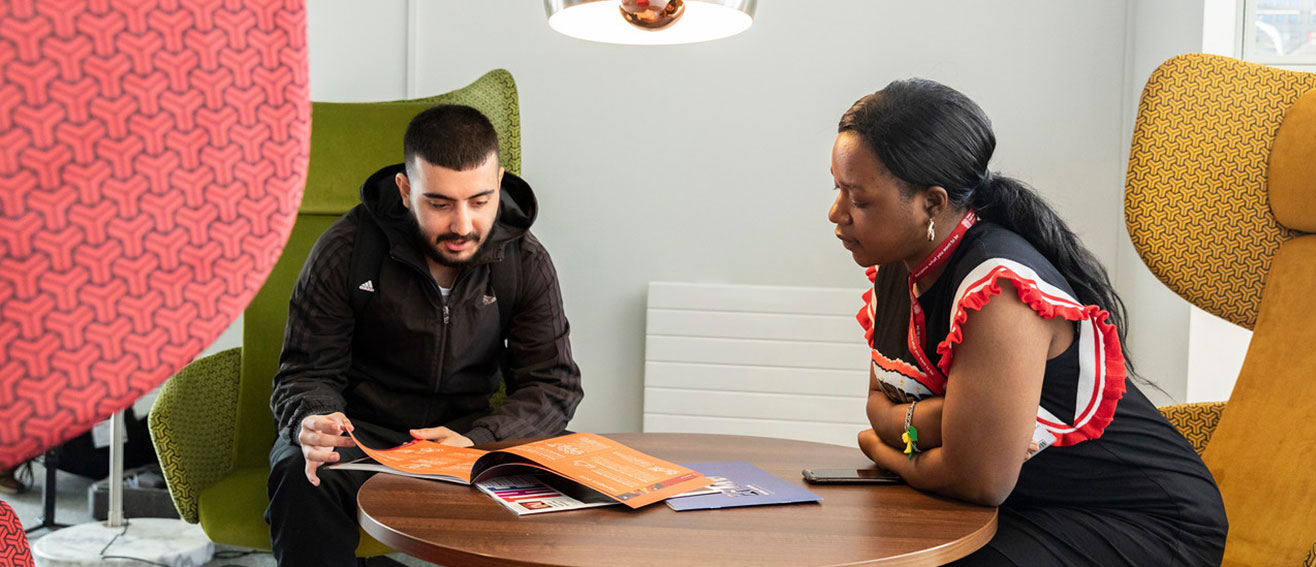Overview
The aim of the course is to provide students with a systematic, comprehensive, and in-depth study of the discipline of international business management. Making use of technology, contemporary research, ethics, and sustainability practices, the course enables students to develop critical evaluation skills and appraise existing theories, hypotheses, and ideas about changes taking place in the world of international business.
The course provides opportunities for students to develop a systematic understanding of the core disciplines of international business, such as strategic management, innovation and consultancy, international marketing and technology, organisational behaviour, global people management, finance, and sustainable project management decisions etc.
The objective of the course is to develop more effective decision-makers who have the knowledge, understanding, confidence and skills to engage in independent, original thought, apply tools of contemporary technology and sustainability, and make business decisions that have relevance in both an academic environment and the workplace. The key features of the course are:
- An integration of technology, sustainable development goals and global inclusivity with employability-oriented and consultancy practices embedded in the course.
- Market-based content properly presented to address practical market needs providing students with competitive edge.
- Close links and opportunities with the LSBU Enterprise Centre.
- Work experience or placement opportunity
- Based on Input from students, ex-alumni, commercial and industrial experts throughout the course.
- Inclusivity, diversity, multicultural and global focus.
- Based in the heart of London.
- Employability, leadership, and team-working skills through the techniques of group projects, consultancy projects, project management, decision-making principles, case studies and other forms of collaborative work
Why International Business Management at LSBU?
- star-o
No.2 in London for satisfaction with courses across Business, Management & Marketing (Guardian University League Tables 2019).
- check-circle
- Professional accreditation - The School has Centre of Excellence status with the IOEE, in recognition of our entrepreneurial culture and leading-edge practice.
- bar-chart
- Outstanding facilities and access to the software widely used in industry: Bloomberg, SAGE, FAME, Nvivo and SPSS.
- rocket
- LSBU graduates have the highest average salaries, one year, three years and five years after graduating. The Office for Students (Ofs) 2024
| ModeFull-time | Duration12 months | Start dateSeptember | Application code5980 | Application method Direct to LSBU |
| ModePart-time | Duration24 months | Start dateSeptember | Application code4764 | Application method Direct to LSBU |
| ModeFull-time | Duration15 months | Start dateJanuary | Application code5981 | Application method Direct to LSBU |

Read My StoryThe modules were carefully designed to provide a well-rounded education that equipped me with the necessary skills and knowledge for my future career.
Ricardo Scheel, Business Management Course
Watch our video to see how you can make yourself at home studying at LSBU.
Location
London South Bank University student union is located at 103 Borough Rd, London SE1 0AA.
If you are visiting our Southwark Campus, you may wish to use our downloadable campus map (PNG File 466 KB). For information on accessibility, see our DisabledGo access guides. See our location page for more details.
Entry Level Requirements
Need further information? Call us on 0800 923 8888 to discuss entry requirements.
Bachelor degree equivalent to UK 2:2 in any subject.
Choose your country
Select country here:
Missing English and Maths qualifications?
If you do not have the required English and Maths qualifications needed to satisfy the entry requirements for this programme, we have courses available at our partner College that you can take to upskill in these areas. Find out more at South Bank College.
United Kingdom
£12500
Tuition fees for home students
International
£18600
Tuition fees for international students
Tuition fees are subject to annual inflationary increases. Find out more about tuition fees for Undergraduate or Postgraduate courses.
-
Full-time
full-time
MSc International Business Management (SEPT) (FT) - Year 1
UK fee: £12500 International fee: £18600 AOS/LSBU code: 5980 Session code: 1FS00 MSc International Business Management (JAN) (FT) - Year 1
UK fee: £12500 International fee: £18600 AOS/LSBU code: 5981 Session code: 1FS00
For more information, including how and when to pay, see our fees and funding section for postgraduate students.
See our Tuition Fees Regulations (PDF File 391 KB) and Refund Policy (PDF File 775 KB).
Possible fee changes
The University reserves the right to increase its fees in line with changes to legislation, regulation and any government guidance or decisions.
The fees for international students are reviewed annually and the University reserves the right to increase the tuition fees in line with the RPIX measure of inflation up to 4 per cent.
Postgraduate loan (PGL) for Masters study
If you are starting a Masters course, studying either full- or part-time, you may be entitled to apply for a postgraduate study loan. Find out more at our postgraduate fees and funding section.
Scholarships
We offer several types of fee reduction through our scholarships and bursaries. Find the full list and other useful information on funding your studies on the scholarships and fee discounts page.
Fee status
Please check your fee status and whether you are considered a Home, EU or International student for fee-paying purposes and for our regulatory returns, by reading the UKCISA regulations.
A student can change to writing up status for the purpose of a lower fee when the examination arrangements have been submitted and approved. Examination arrangements are submitted 3 months prior to submission of the thesis for examination. A student only has one year of writing up at the reduced fee that covers submission, viva, and minor corrections. The writing up fee 25/26 is £1,246
International students
The course is not currently open to international students.
International (non Home) applicants should follow our international how to apply guide.
Home
| Mode Full-time | Duration 12 months | Start date September | Application code 5980 | Application method Direct to LSBU |
| Mode Part-time | Duration 24 months | Start date September | Application code 4764 | Application method Direct to LSBU |
| Mode Full-time | Duration 15 months | Start date January | Application code 5981 | Application method Direct to LSBU |
Postgraduate students and research students should apply through our dedicated application system. Full details of how to do this are supplied on our How to apply section for postgraduate students and our How to apply section for research students.
See our admissions policy (PDF File 1,520 KB) and complaints policy (PDF File 516 KB).
Accommodation
Students should apply for accommodation at London South Bank University (LSBU) as soon as possible, once we have made an offer of a place on one of our academic courses. Read more about applying for accommodation at LSBU.
Finance
It's a good idea to think about how you'll pay university tuition and maintenance costs while you're still applying for a place to study. Remember – you don't need to wait for a confirmed place on a course to start applying for student finance. Read how to pay your fees as a postgraduate student.
Prepare to start
We help our students prepare for university even before the semester starts. To find out when you should apply for your LSBU accommodation or student finance read the How to apply tab for this course.
Welcome Week
Before you start your course we'll send you information on what you will need to do before you arrive and during your first few days on campus. You can read about the process on our Welcome Week pages.
Term 1 | ||||||
Consultancy, Enterprise and Innovation | Decision Making | Strategies for International Market Expansion | ||||
Term 2 | ||||||
International Organisational Behaviour | Quantitative Project Control Systems | Research Methods | ||||
Term 3 | ||||||
Capstone Project and Launch | ||||||
Module descriptions
Consultancy, Enterprise and (compulsory) This module is designed to develop students’ awareness of the entrepreneurial mindset and management consultancy skills. Students will learn how to evaluate ideas and businesses and understand how to build enterprises and to find creative and innovative solutions for challenging problems. The module will present and consolidate principles of company inception and consulting drawn from contemporary practices, specific tools, methods, and approaches designed to create and diagnose organisations, develop implementations, evaluate options, and effectively communicate objectives/recommendations. Students will look at enterprises from the perspective of entrepreneurs and that of consultants. The module aims to help students understand the process by which they can turn ideas into viable businesses through innovative thinking and creative use of data. Students will learn how to evaluate and analyse ideas and how to build and scale up a business from scratch. The module, through the different topics it probes, helps students develop entrepreneurial and consulting skills. For example, students will learn how to collect data, how to analyse data effectively and efficiently and how to communicate their findings to their targeted audience to achieve their intended results. Assessment: Business Evaluation, Business Plan, Consultancy Report Presentation, Business Pitch
Decision Making (compulsory) Decision-making is behind all business operations, processes, adaptation and ultimately to their success or failure. However, according to decades of research in psychology and behavioural economics, human decision-making rarely leads to optimal choices. Instead, our decisions are biased by a multitude of factors including perception, time constraints, context, emotions, as well as social and economic pressures. Accordingly, understanding the complex nature of human decision-making is essential for prospective business executives. This module introduces students to classical and contemporary theories of decision-making, where students are challenged to critically apply decision theory and empirical findings to business and management contexts. Assessment: Essay (Individual) Strategies for International Market Expansion (compulsory)
This module aims to enable students to understand and apply international marketing concepts to different sectors as well as contextualising the subject for different types of organisations in different countries and cultures. The module also provides students with a working knowledge of the issues addressed by international marketers based on an understanding of the analysis of international marketing opportunities, international markets; international marketing decision-making and strategy formulation. Understanding international marketing concepts and developing international marketing skills are essential for the success of organisations operating in increasingly global, challenging and changing markets. This module develops an understanding of the fundamentals of marketing and provides an overview of the macro-environment of international business and economic development. This lays the basis for an appreciation of strategic international marketing expansion challenges including the use of big data, digital analytics, and global supply chain management. The course provides a strategic overview of international marketing issues, integrating theory and practice across a wide range of international business contexts.
Assessment: Report (Individual)
Quantitative Project Control Systems (compulsory) his module aims to equip students with advanced technical skills in project management, focusing on the planning, controlling, and evaluation aspects. Students will gain proficiency in quantitative project control systems to enhance their ability to successfully manage complex projects. This module delivers a comprehensive understanding of diverse quantitative project control systems, ensuring students grasp both the theoretical foundations and practical applications. Through hands-on experiences, students develop practical skills in using quantitative tools for project planning, monitoring, and evaluation, enabling their application in real-world project scenarios. Emphasising critical thinking, the module enhances decision-making proficiency as students learn to assess situations, choose appropriate quantitative methods, and make informed decisions to optimize project outcomes. Practical workshops and case studies provide opportunities for students to apply industry-standard tools like project management software, critical path analysis, and earned value management. Assessment: Business Report
International Organisational Behaviour (compulsory)
This postgraduate module approaches the changing nature of work and employment through an organisational behaviour lens. It discusses and debates the pivotal role of culture and the implications for people management and leadership strategies in multinational and national enterprises. The module focuses on national culture, leadership, teamwork, employee engagement, diversity and inclusion, motivation and engagement. We will ensure coverage of the global south, as part of our attempt to present information through a progressive and decolonised lens. As we acknowledge the impact of global crises on organisations, we also explore organisational and employee resilience as responses to such turbulence and change. After completing this module; you shall be able to critically present the concept of leadership and its application in managing individual, team and organisational performance within diverse international settings. identify the key antecedents of the psychological construct, work engagement, such as reward (financial and non-financial), employee relations, organisation culture and national culture. Assessment: Individual report on an International case study and Personal Reflection
Research Methods (compulsory) This module introduces students to the research process and aims to develop their research skills and knowledge. Specifically, this module focuses on the philosophy, approaches, methods, tools, and techniques of research within relevant disciplines from the business environment. In doing so, it provides students with the skills required to develop an individual research proposal. Accordingly, by the end of the module students will have knowledge to identity a research topic and formulate clear research questions, objectives, and hypotheses, that are supported by relevant literature and theoretical concepts. Furthermore, students will be able to develop an appropriate research method (e.g., including research design, materials, procedures and data collection), evaluate ethical considerations of the project, and understand how data can be appropriately analysed. Assessment: Research Proposal
Capstone Project/Dissertation The capstone, independent research project draws upon students’ skills and knowledge gained thus far enabling application to a scenario resulting in added value to an organisation, creating real world impact. The module further develops students as business research experts via the completion of a comprehensive business report. Assessment: Capstone Project Report and Presentation |
Careers
Employability Service
The course structure and modules are embedded with opportunities to develop a range of hard and soft skills that will lead to a high potential for employability. You are learning about being a consultant, project manager, decision maker, international marketer and leader and sharpening your research and creative as well as critical analytical skills. During your course, you will find our employment prospects are excellent. In addition to senior management roles, successful students can build a career in a variety of settings in consulting, marketing, finance and human resource management. In this respect, our emphasis on personal development allows graduates to become desirable to a variety of organisational cultures and functions inside multinational companies. At LSBU, we want to set you up for a successful career. During your studies – and for two years after you graduate – you’ll have access to our Employability Service, which includes:
Our Student Enterprise team can also help you start your own business and develop valuable entrepreneurial skills. Employment prospects are excellent. In addition to senior management roles, successful students can build a career in a variety of settings in consulting, marketing, finance and human resource management. In this respect, our emphasis on personal development allows graduates to become desirable to a variety of organisational cultures and functions inside multinational companies. |
Employment prospects are excellent. In addition to senior management roles, successful students can build a career in a variety of settings in consulting, marketing, finance and human resource management. In this respect, our emphasis on personal development allows graduates to become desirable to a variety of organisational cultures and functions inside multinational companies.

- Centre of Excellence status is the IoEE's (Institute of Enterprise and Entrepreneurs) flagship organisational accreditation for organisations that promote and deliver enterprise skills development; and is in recognition of the School's entrepreneurial culture and leading-edge practice.
Memberships

LSBU Business School is an esteemed member institution of the Business Graduates Association (BGA), an international membership and quality assurance body of world-leading and high-potential Business Schools who share a commitment for responsible management practices and lifelong learning, and are looking to provide positive impact on their students, communities, and the economy as a whole. BGA is the sister brand to the Association of MBAs (AMBA), the world's impartial authority on postgraduate management education.
As a BGA member institution, students of LSBU Business School are able to access BGA's individual membership, which offers a range of tools and resources designed to support the professional and personal development of business students and graduates, free of charge. This includes CV building services, a job search function, skill assessments, thought-leadership, partner discounts and much more.
Teaching and Assessment
Teaching and Assessment Theory and overviews will be presented in a series of formal lectures. These will be supported by a programme of seminars through the use of videos, group work and exercises. Case studies have an important role to play within the overall teaching strategy. They are selected to achieve wide sectional coverage of international industry and services including traditional, mature and technically advanced sectors e.g. international retailing, airlines, pharmaceuticals, consumer electronics, automobiles, and computers. Self-managed learning Students are expected to spend an average of eight hours per week in self-managed learning to support the unit. Such learning includes case study preparation; all students are expected to have undertaken a preliminary reading of the case study before it's discussed in class. Self-managed learning also includes week-by-week reading in one of the core strategy set texts, assignment preparation and writing, as well as examination revision. Personal Tutoring As a postgraduate student in the Business School, your personal development and wellbeing is very important to us, so we have developed a personal tutoring system that is tailored to your individual and group needs. Firstly, you will be allocated a personal tutor who will be available to you on a 1:1 basis as well as facilitating group personal tutoring sessions, designed to enhance your academic and personal development within your postgraduate degree programme. In addition to an allocated personal tutor, there will also be a personal tutor available ‘on call’ in a designated room, called ‘Talk’, for confidential 1:1 pastoral care meetings every day of the academic semester from 9am to 8pm. This personal tutor can be seen by appointment or within a few minutes in order to assist you with any concerns that you may have. Our personal tutoring motto is that we want you to "Achieve, Succeed & Excel". Learning support We support students throughout their course in many different ways, such as: - Personal tutoring - Support sessions on core skills taking place weekly. - Peer student led support sessions. - Professional learning community (PLCs) - Practical skills workshops - Labs equipped with the latest hardware and software. - Lectures, seminars, personal tuition - Online learning materials - Varied assessment methods - Advice on work experience and career options - Opportunities for internships, work placements and projects with employers - Tailored field trips - Training in research methods and assistance with independent research projects. - Free Access to LinkedIn Learning Courses - Free Job Simulation courses via Forage.com |




